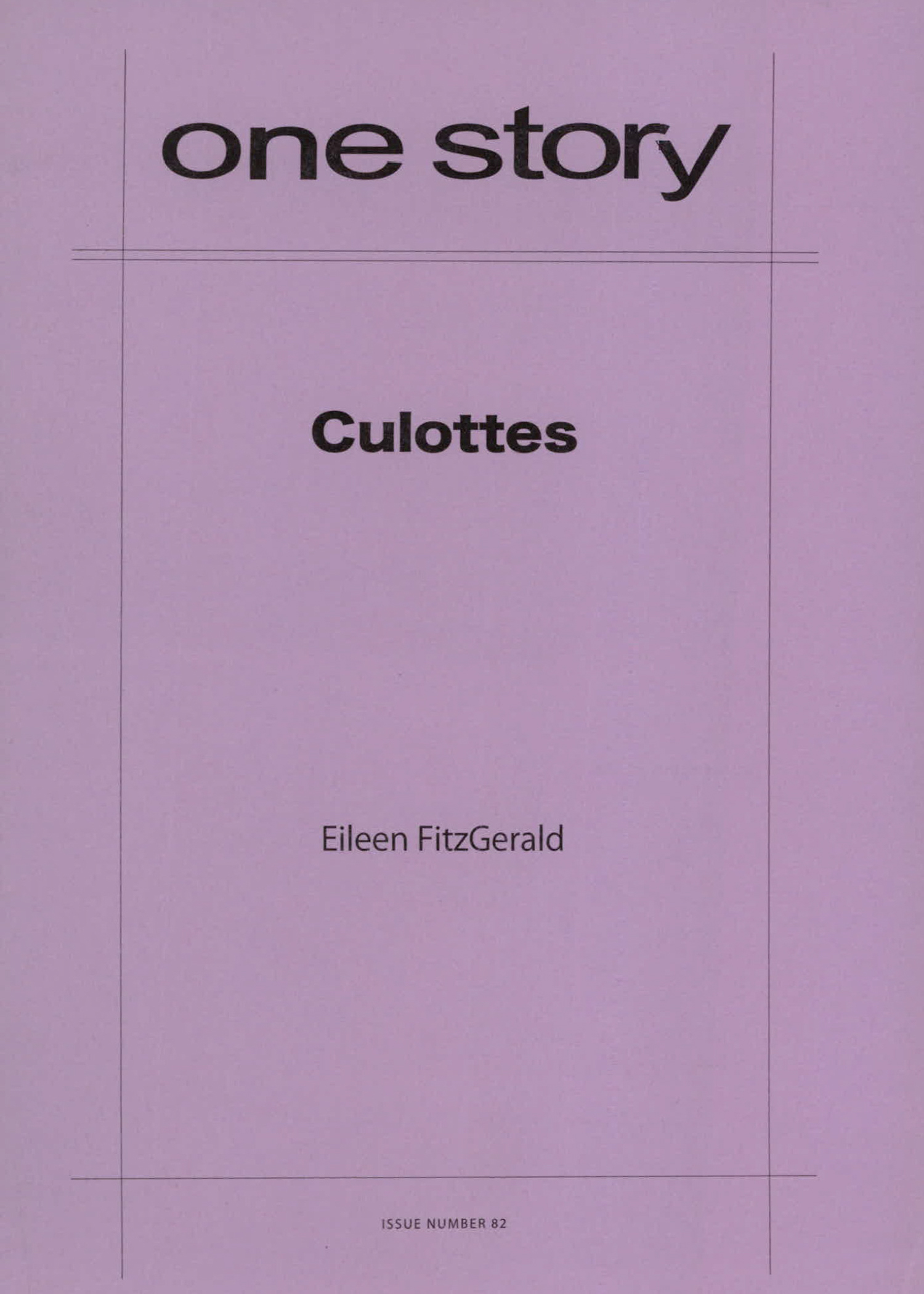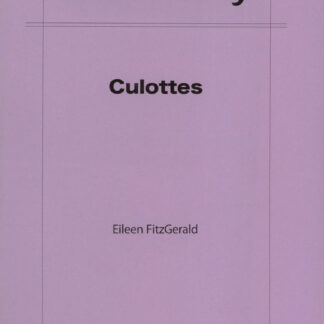
Culottes
48 in stock
Excerpt
For the outing to the redwoods, Vanessa wore sneakers, socks, shorts, and a hooded sweatshirt. She thought those clothes would be appropriate, or rather, she thought nothing of them, until the horn honked in front of her house, and she hopped into the back seat of the car and saw that Sally, her friend from work, and Sally’s roommates all had on dark skirts and white blouses, laced leather shoes and panty hose.
“These are three of my roommates,” said Sally, turning from the steering wheel to greet Vanessa. “Marisa, Judy, and Kate.”
Vanessa surveyed the group. “I see we’re ready for some serious hiking,” she said. She smiled, and they all laughed. She was twenty-three and figured that the others were scattered through their twenties, although their clothes made them look older and dowdy. Sally, she knew, was twenty-six.
From the front seat, someone—Marisa?—presented her with a sticky honeybun and a paper napkin. “The last breakfast roll. We ate ours at the house.”
Through the gap in the seats, Vanessa watched Sally driving. Sally always biked to work—in dress and helmet—and Vanessa had never seen her in a car before. Driving, Sally sat tense and upright, with her hands at ten and two. She signaled right and pulled away from the curb. She fixed the mirror. Her movements were restrained and careful and not what Vanessa expected, though she couldn’t say what she did expect from Sally.
Eileen FitzGerald
Eileen FitzGerald lives in Salem, Massachusetts, with her husband and sons. Her collection of short stories, You’re So Beautiful, was published by St. Martin’s Press. Her fiction has appeared in Prairie Schooner, The Iowa Review, The Gettysburg Review, Indiana Review, and other literary magazines.
Q&A by Hannah Tinti
- HT: Where did the idea for this story come from?
- EF: The first year after college can be such a lonely, confusing time, and I wanted to write a story about someone negotiating that year, working at a dumb job, trying to make friends, trying to figure out how to fill the hours.
- HT: What was the most challenging aspect of writing this story?
- EF: The hardest part was the ending. For a long time(years), the story ended in the locker room with Sally coming out in her culottes and Vanessa being shocked and embarrassed and that was it. That ending gave too much importance to the clothes, and to the fact that Sally went jogging in funny clothes. The culottes were shocking to Vanessa, but I needed something that could shock the reader. When I learned about cilices, it felt like a eureka moment. I only recently read The Da Vinci Code, and was surprised to see cilices make an appearance there. I was probably the last person in America to know about them.
- HT: What made you want to write about numeraries? And how much research did you do in order to portray their lifestyle?
- EF: At a point in my life I knew some numeraries, and they seemed mysterious and cheerful. I’ve always kept an eye out for information about them since. As for research, I did a little reading and looked at a few websites.
- HT: Why does Sally keep this part of her life a secret from Vanessa?
- EF: I think Sally is concerned about being judged. Her life works for her, she’s happy with it, but she doesn’t want to call attention to herself. Sally keeps her private life private from most people, not just from Vanessa. But Vanessa wants and needs more from the friendship; to Vanessa the secret feels like a betrayal.
- HT: How did the culottes become the center of this piece? Is it because Sally wears them for Vanessa?
- EF: For me the culottes point out the impossibility of Sally and Vanessa ever really understanding each other. Sally wears the culottes for Vanessa, but Vanessa can’t fathom the idea of someone jogging in a “dress”. They’re two people who view the world in very different ways.
- HT: Why did you choose to use a flash forward at the end of the story? And can you give us a brief flash forward for Sally? What happens to her?
- EF: I really wanted that cilice in the story, but it’s a personal item that couldn’t logically make an actual appearance. Sally would never have shown it to Vanessa or to anyone, not in a locker room, not by accident, never. The cilice had to come later, but the action of the story peaks in the locker room, and I wanted the story to end there. It was trial and error to figure out how to make it work. Going straight from the locker room to Vanessa reading the book about numeraries felt too abrupt. Eventually I happened upon the idea of flashing backward to Vanessa in college talking to the demography professor and then moving forward in time from there. As for Sally, I think she is much the same person she was in the story, living quietly and contently with her roommates. Maybe she’s branched out a little in her reading. She might have read the Da Vinci Code, but she didn’t like it.
- HT: What does this story says about friendship? Do you think it’s impossible to ever truly know each other?
- EF: I don’t know if the story speaks to friendship in any universal way, unless it’s to say that every friendship is its own beast. Vanessa and Sally are specific individuals who meet at a certain time in each of their lives, and they have the friendship that results from that particular mix of variables. Vanessa and Sally probably can’t ever really know each other, but people can; it’s possible!
- HT: How long did it take you to complete this story?
- EF: I wrote the first draft of Culottes 17 years ago when I was in graduate school, and there were several other drafts through the years. But I could never pull it together, and a time came when my writing friends and my husband declined (refused) to read any new drafts. I was told gently but firmly to work on something else. So I filed the story away, and it sat there for years and years. From time to time I would meet new writing friends and warn them not to read Culottes, even if I begged. Then last winter I learned about cilices and thought maybe I could rework things. I gave myself a deadline of one month to see if I could work the cilice in, but I ended up revising for more like six months. My husband, J.D. Scrimgeour, read some drafts, and my friend Meg Rubin was a big help. Hannah made some great suggestions too. So in a way, it did take 17 years to finish, even though I wasn’t actually working on it for all that time.
- HT: What is the best bit of advice about writing you have ever received?
- EF: I like any writing advice that tells you to just sit down and write. I’ve gotten that advice many times, and sometimes I listen to it and actually get some work done. The worst advice I ever came across was in the book On Becoming a Novelist by John Gardner. He said he liked to work in long stretches, something like twelve hours at a time. I used to feel like I wasn’t working hard enough, or accomplishing enough because I couldn’t carve 12 hours out of my day for writing.
- HT: What are you working on now?
- EF: I’m working on some stories with the hope of getting together a collection. And I’ve recently dusted off the beginning of a novel that I put aside a while ago.
